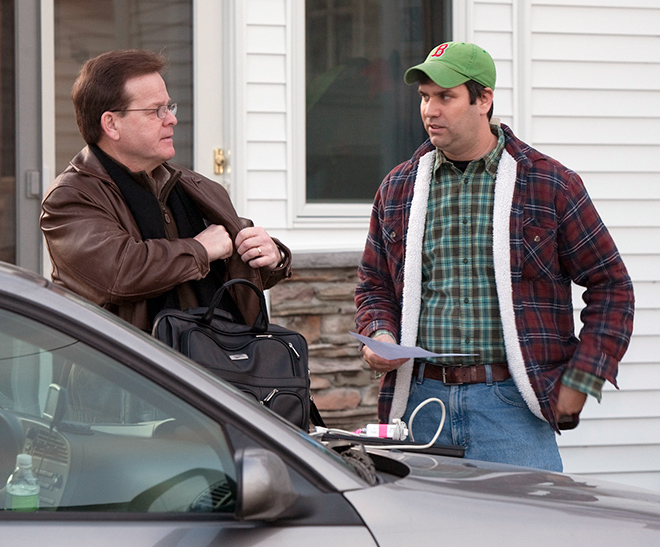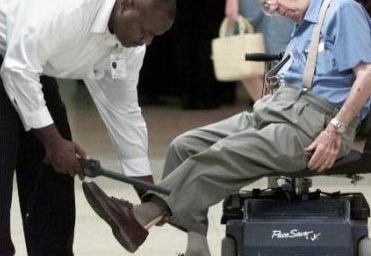TSA Bullies Bloggers Who Published Leaked Procedures

TSA Special Agent John Enright, left, speaks to Steven Frischling outside the blogger's home in Niantic, Connecticut, after returning Frischling's laptop Wednesday. Photo: Thomas Cain/Wired.com
There’s quite a bit of chatter this morning about the fact that two travel bloggers of whom I’d never previously heard have had their computers confiscated pursuant to subpoenas after publishing unclassified but sensitive TSA screening procedures. AP’s Eileen Sullivan has the rundown:
As the government reviews how an alleged terrorist was able to bring a bomb onto a U.S.-bound plane and try to blow it up on Christmas Day, the Transportation Security Administration is going after bloggers who wrote about a directive to increase security after the incident. TSA special agents served subpoenas to travel bloggers Steve Frischling and Chris Elliott, demanding that they reveal who leaked the security directive to them. The government says the directive was not supposed to be disclosed to the public.
Frischling said he met with two TSA special agents Tuesday night at his Connecticut home for about three hours and again on Wednesday morning when he was forced to hand over his lap top computer. Frischling said the agents threatened to interfere with his contract to write a blog for KLM Royal Dutch Airlines if he didn’t cooperate and provide the name of the person who leaked the memo. “It literally showed up in my box,” Frischling told The Associated Press. “I do not know who it came from.” He said he provided the agents a signed statement to that effect.
In a Dec. 29 posting on his blog, Elliott said he had told the TSA agents at his house that he would call his lawyer and get back to them. Elliott said late Wednesday he could not comment until the legal issues had been resolved.
[…]
The TSA directive outlined new screening measures that went into effect the same day as the airliner incident. It included many procedures that would be apparent to the traveling public, such as screening at boarding gates, patting down the upper legs and torso, physically inspecting all travelers’ belongings, looking carefully at syringes with powders and liquids, requiring that passengers remain in their seats one hour before landing, and disabling all onboard communications systems, including what is provided by the airline. It also listed people who would be exempted from these screening procedures such as heads of state and their families.
So far, I can live with this. As several reporters, including those employed by prestige outlets like the New York Times, have learned to their chagrin, there is no federal shield law. That means journalists are required, like any other citizen, to comply with subpoenas or face the consequences.
But it gets much uglier, as Wired‘s Kim Zetter reports,
“They’re saying it’s a security document but it was sent to every airport and airline,” says Steven Frischling, one of the bloggers. “It was sent to Islamabad, to Riyadh and to Nigeria. So they’re looking for information about a security document sent to 10,000-plus people internationally. You can’t have a right to expect privacy after that.”
Transportation Security Administration spokeswoman Suzanne Trevino said in a statement that security directives “are not for public disclosure.” “TSA’s Office of Inspections is currently investigating how the recent Security Directives were acquired and published by parties who should not have been privy to this information,” the statement said.
Frischling, a freelance travel writer and photographer in Connecticut who writes a blog for the KLM Royal Dutch Airlines, said the two agents who visited him arrived around 7 p.m. Tuesday, were armed and threatened him with a criminal search warrant if he didn’t provide the name of his source. They also threatened to get him fired from his KLM job and indicated they could get him designated a security risk, which would make it difficult for him to travel and do his job. “They were indicating there would be significant ramifications if I didn’t cooperate,” said Frischling, who was home alone with his three children when the agents arrived. “It’s not hard to intimidate someone when they’re holding a 3-year-old [child] in their hands. My wife works at night. I go to jail, and my kids are here with nobody.”
[…]
A former federal prosecutor who asked not to be identified told Threat Level that the TSA is being heavy-handed in how it’s handling the matter. “It strikes me that someone at TSA is apoplectic that somehow there’s a sense that they’re not doing their job right,” he told Threat level. “To go into this one reporter’s house and copy his computer files and threaten him, it strikes me that they’re more aggressive with this reporter than with the guy who got on this flight.”
While I’m not an attorney, there’s no reason to think the bloggers in question did anything illegal, or even unethical, in publishing documents that TSA failed to secure. People who have security clearances and authorized access to government documents have a fiduciary obligation to protect them and can, in some instances, face serious criminal penalties for disclosing them to unauthorized recipients — including those with sufficient clearances but no need to know. But civilians who receive classified information through the illegal actions of government employees have no legal duty to safeguard it. Indeed, the Supreme Court has ruled that newspapers are within their 1st Amendment rights to publish even Top Secret documents.
I’ve got no beef with TSA trying to figure out who leaked these documents. The person or persons who did so did indeed compromise security procedures and deserve to face the consequences of their actions. Once subpoenaed, Frishling and Elliot were under obligation to cooperate. But the heavy-handed treatment is uncalled for. And threatening to place someone on a no-fly list reserved for terrorist suspects is an abuse of authority, pure and simple. If true, the perpetrator should face severe sanctions.
UPDATE: Glenn Reynolds‘ pithy summary of the episode:
Threatening public safety — wrong. Making bureaucrats look bad — unforgivable!
A tad unfair, perhaps, but a great line.



I follow your basic logic, but I have to say that if a document is electronically distributed globally, and with thousands of people having potential access, is that document in any way “secure” in the first place? Does it even reach the level of “leak” for it to be forwarded on to a travel writer?
They might get farther by threatening those who violate their security clearances and follow through with the threats. Sheesh. Shoot the messenger.
But that would be assuming that the intent was to secure stuff that should remain secret rather than to intimidate the press (and, yes, I think that anybody who engages in journalism is “the press”, not just people who work for newspapers, magazines, wire services, or television news programs).
A fair point. But there are lots of large bureaucracies whose internal workings are unknown to us. I’ve got a decent idea what TSA is looking for, applying simple logic, but wasn’t privy to the specific tells they were looking for.
The TSA might be in better shape if the GOP was not blocking its new boss, Erroll Southers from starting his job.
Forget Airliner bombers; if the TSA doesn’t take the threat of Americans discussing their policies seriously, they could face a real secuirty breach: job security.
I’m sure investigating this leak is there top priority right now.
A cursory glance at his resume leads me to believe he’s qualified for the job. Indeed, his wanting to model LA airports after Israel’s should have won him lots of Republican fans.
The GOP is blocking him over a dispute on whether TSA security guards should be able to unionize. I think the Republicans are right on this one but think qualified nominees should be rubber stamped absent something more serious than a policy dispute.
At the same time, I’m quite certain that he wouldn’t have TSA fixed after a few months on the job. Indeed, I don’t believe TSA fixable.
That may well be true, but since, as the GOP can’t seem to stop saying for 12 seconds, we are at war, it is probably a good idea to have someone at the helm and make the best go of it we can.
Hide the Decline….in the security of airline travel. That is all this is.
No one has committed a crime. No classified information was released. The document was “not for public release”, which has no legal basis. So they discover some GS sent this memo to someone not on the distribution. The GS gets a black mark on their annual performance review. Worse, case is the information is used to deny a security clearance which puts them out of a job. If it was on of the thousands of private individuals worldwide who released the memo, their boss gets a nasty note and perhaps the TSA refuses to send future memos until the person is transferred.
As for the DHS investigator’s threats, well it is standard for investigators to get their thug on. It’s in the training. Unless they go through with the threat it is rarely actionable or provable. Testilying is a time honored tradition in law enforcement so is denying thuggish behavior performed while in the field. These bloggers’ mistake was in not realizing that by angering the TSA they were going to be visited and having a recording device handy to keep things honest. Without independent proof, no judge and no one at DHS is going to be cornered into taking action against standard practice.
The DHS is learning about the Streisand Effect. They hoped to plug a leak that makes them look bad but their thuggish behaviors are making them look bad to far more people. Showing up with a subpoena is lawfully seeking information, making threats of retaliation for not dropping to bended knee before the mighty power of DHS, is an internet story on a holiday weekend.
As I recall there are some protections of freedom of the Press to include protecting resources even in some criminal activities cases. There is a limit of course but many truly secret and classified information have been disclose by the Press without them being required to give up their sources. IMO there is some legitimacy to this but is often overdone.
Some may claim that bloggers are not the Press but I disagree. They reach as many and are as informative as many newspapers or magazines.
This case is more about shutting people up who embarrass the TSA and this administration than anything else. Where is the ACLU?
For all you conservatives out there the TSA is just another hugely incompetent and bloated bureaucracy created by our very own inbred house idiot…former El Presidente Georgie Bushie.
Just thank God so far we have had some mighty incompetent bombers. Because sooner or later even this cast of clowns will figure it out. The TSA can’t keep the clowns off the airliners. What makes us think they will have a prayer of stopping the real operators when they show up.